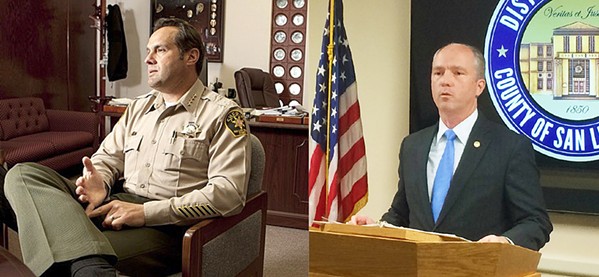San Luis Obispo County Sheriff Ian Parkinson and District Attorney Dan Dow both expected fights.
Given the criticism that's followed the county's top law enforcement officers in recent years—from the jail death of Andrew Holland in 2017, to Parkinson's comments criticizing mask mandates and denying systemic racism in 2020, to Dow's prosecutions of Black Lives Matter protesters—both men entered this election season ready for anything.

- File Photos
- REELECTED SLO County Sheriff Ian Parkinson (left) and District Attorney Dan Dow (right) skated to uncontested reelections on June 7.
"I was prepared for an opponent," Dow told New Times in his office above the downtown SLO courthouse. "Nothing would have surprised me."
And yet, no challengers emerged. Parkinson and Dow ran unopposed campaigns in 2022, and on June 7, they secured easy reelection victories. Parkinson won his fourth term and Dow his third term in office.
"I'm grateful," Dow said. "If the masses weren't satisfied that we were doing good work here and getting good results, I would've drawn an opponent."
But the lack of an election fight was not a matter of a lack of interest in one, according to Rita Casaverde, who chairs the SLO County Democratic Party.
Democratic Party leaders recruited heavily for candidates who would challenge either of the two Republican incumbents, especially Dow.
Locals expressed particular dissatisfaction with the DA, Casaverde said, citing his "fundamentalist" stances during the pandemic supporting church gatherings and singing despite public health orders. The DA's Office crackdown on "Black and young protesters" during the local Black Lives Matter movement also angered residents, she said.
"We had so many people interested in supporting a different candidate. We tried for months," Casaverde said. "We had different conversations. We had a candidate who was ready. But at the end of the day, they couldn't commit."
One hurdle was time, Casaverde said. Another was money. And another was fear of retaliation at work.
"They were afraid that the environment would become hostile," she said. "It is concerning, but at the same time not surprising. Because this community is so tiny, especially if you are involved in law enforcement, you'll be seen as crossing the blue line."
Proud of progress
In Sheriff Parkinson's office, a "thin blue line" flag pops off of his wall, and outside, in the hallway, a bulletin board is up showcasing letters of thanks from community members over the years.
"We have tremendous support from the public," Parkinson told New Times. "When we had our shootings, our stations were absolutely inundated with cards, ribbons, and food."
The past four years have been tough for local law enforcement, Parkinson said. Multiple officer-involved shootings—including a standoff with a man in Paso Robles who ambushed and shot two deputies in 2020 and the fatal shooting of SLO Detective Luca Benedetti in 2021—marked a term of unprecedented violence.
"When we have five shootings in 13 months, that's very disturbing. That is extremely concerning," Parkinson said.
Parkinson sees those incidents as examples of the mental health epidemic in the county, which is coinciding with a spike in crime. Drug overdose rates have almost doubled in the last three years, Parkinson said. He pins the public safety issues today on state-level reforms, like Propositions 47 and 57, which he believes "have made it more dangerous for the average citizen."
"I think the state of California has made some tremendous mistakes," he said. "We wouldn't have had five shootings if there was more accountability [in the justice system], but we've taken away accountability in a lot of areas. ... For me, it means I need more deputies on the street."
During his last term, Parkinson said his biggest focus was the jail. Following Holland's widely condemned death in custody—which was a result of being strapped to a restraint chair for two days—the county came under federal investigation.
"At the time of Andrew's death, we had three entities running the jail: We had the Health Department, Behavioral Health, and my department. It was a recipe for disaster, and we knew it," Parkinson said.
In response, SLO County outsourced its jail medical care services and hired a chief medical officer for oversight. Parkinson thinks the new system is working and said the jail is on the verge of becoming nationally accredited for it.
"That is the highest standard you can achieve," he said.
And yet, last year, the Department of Justice (DOJ) issued an investigative report alleging years of constitutional abuses at the jail, including for inadequate medical and mental health care. Parkinson said the county is working with the DOJ on a resolution and believes the report focused on the jail's past rather than its present.
"The problem I had with the DOJ report is the majority of the stuff they were citing was going back in time to when health care wasn't under my command, and the majority of the things in the report had changed already," Parkinson said.
Building bridges
After a term filled with community controversy and high emotions, Dow said he wants to turn down the temperature around the work of the DA's Office and try to build more bridges in the community.
"Where most of the friction comes is from misunderstandings or assumptions that people might have about our system," Dow told New Times. "That's front and center now. ... There's much greater scrutiny on the work that we do."
Dow believes that that scrutiny comes from all angles—from both sides of the political spectrum, from police agencies, activist groups, and everyday residents. He describes his work, no matter the public pressure, as "an ethical search for the truth."
But Dow was accused of doing just the opposite of that after Black Lives Matter protests hit the county in 2020. When the DA's Office pursued charges against protesters involved in a march that blocked Highway 101, a judge disqualified it from the case due to bias. That ruling, which Dow vehemently disagrees with, is still pending appeal two years later.
"The [state] attorney general agrees with us that it was an erroneous ruling. It's not a right-wing, conservative, law-and-order guy saying it's a wrong ruling," Dow said.
Dow views the charges pursued against protesters as important and reasonable.
"We haven't been overbearing, but I think it's appropriate that we enforce the law in our community and not allow things to get out of hand," Dow said. "Because Portland, Seattle, Minneapolis, a lot of other cities that took a view of we're just going to let this all be deemed a freebie because it's free speech, they had a problem with things escalating over time. I don't know if that would've happened here or not, but I know it didn't happen."
Like Parkinson, Dow sees the biggest challenges in public safety today as a result of state policies too focused on "compassion for the offender."
"I really believe that we're seeing in California a huge spike in crime," he said, "and I believe it is tied to going too far on criminal justice reform and forgetting about victims and the community, and not putting them on an equal footing as offenders." Δ
Assistant Editor Peter Johnson can be reached at [email protected].

Comments